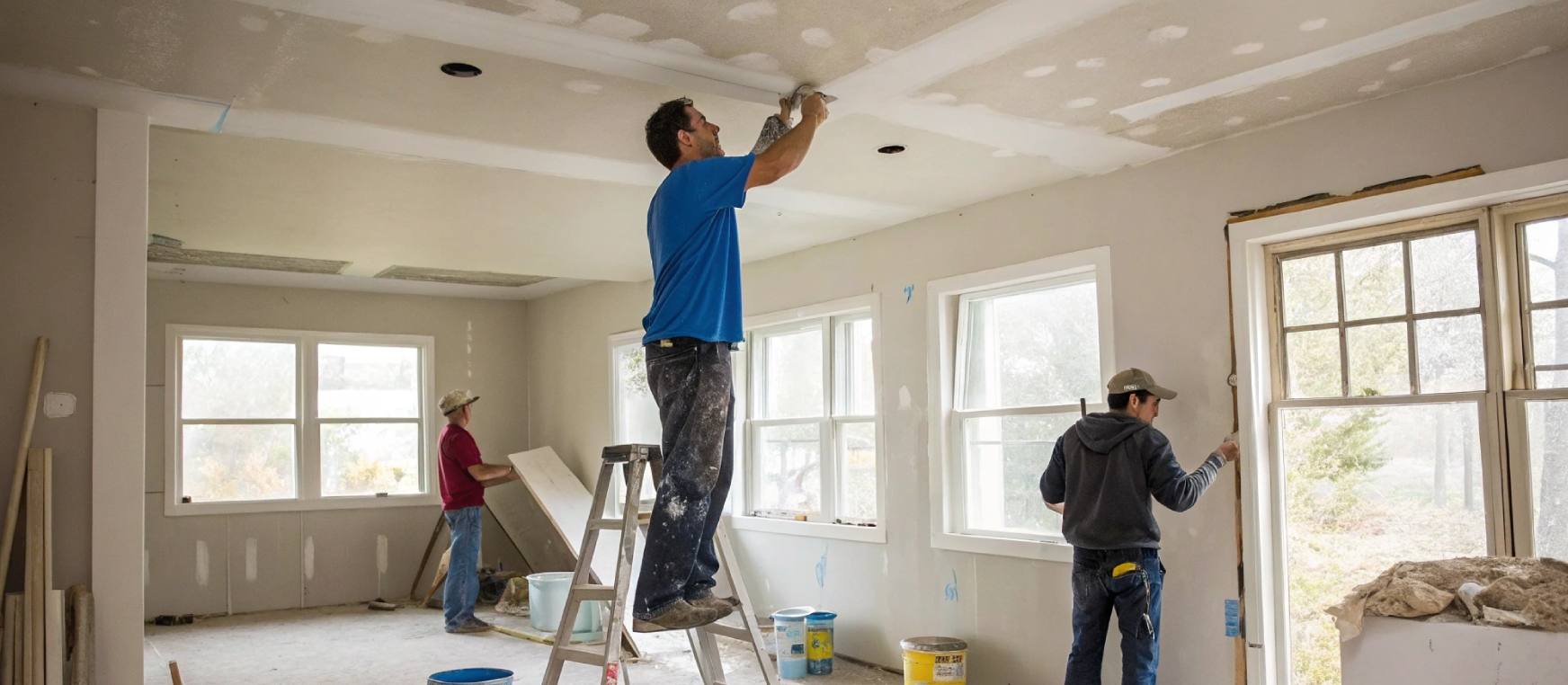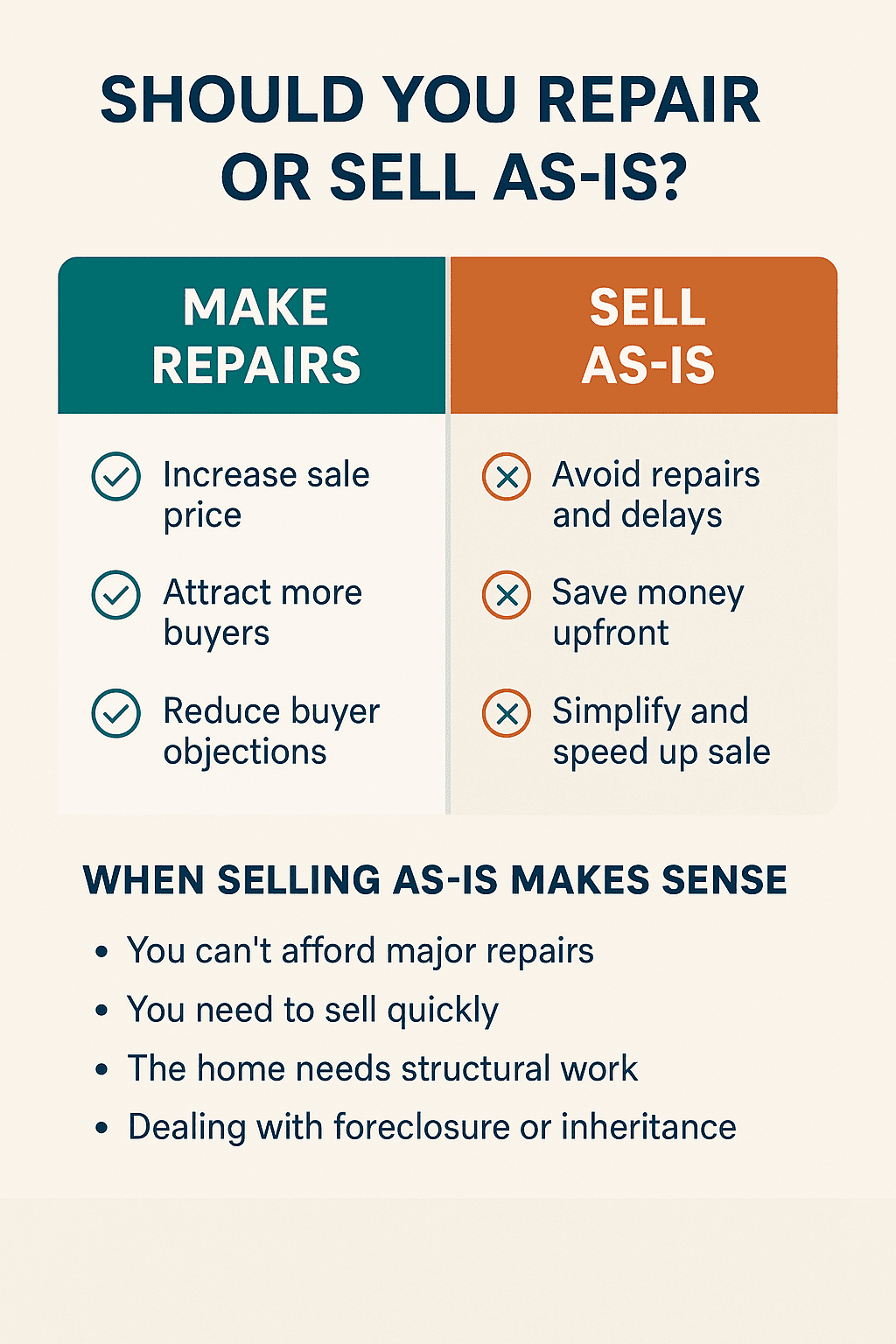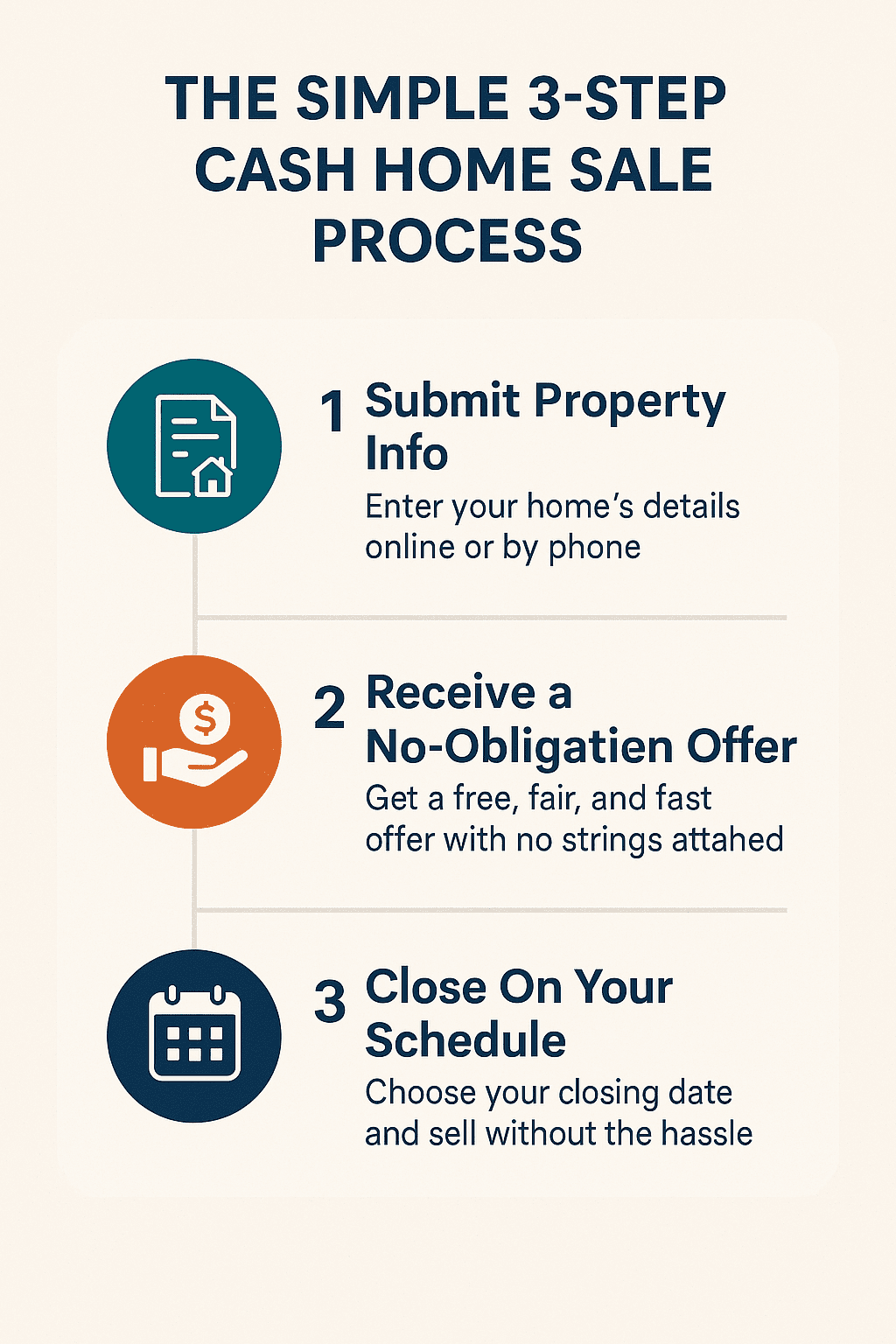Selling a house that needs repairs might feel overwhelming, but you have more options than you think. Whether your home needs minor touch-ups or major work, you don’t have to fix everything to sell it. The key is understanding your choices and choosing a path that works for your timeline, budget, and goals.
In this guide, we’ll walk you through how to sell a house as-is, what to repair (and what to skip), how to price it right, and why cash buyers may be your easiest route forward. If you’re ready to sell without the stress of fixing every crack and leak, you’re in the right place.
Understand What Selling “As-Is” Really Means
Selling a house “as-is” means you’re offering the property in its current condition, with no promises to make repairs or upgrades. The buyer takes full responsibility for any issues once the sale is complete.
This approach can save you time and money, especially if the home needs major repairs. However, it doesn’t exempt you from disclosure laws. Most states require sellers to disclose known issues such as structural damage or water leaks.
What buyers expect when you sell as-is
Buyers shopping for as-is homes often expect some level of risk. They may be investors, flippers, or buyers with renovation experience. These buyers typically come prepared for cosmetic flaws or outdated systems, but they still want clarity on major problems.
Providing accurate information , even in an as-is sale , can help you attract serious offers and avoid drawn-out negotiations later.
Common misconceptions about as-is sales
One common myth is that selling as-is means you don’t have to tell buyers anything. In reality, most states still require full disclosure of known defects. Another misconception is that no one will buy a fixer-upper. In fact, many buyers actively seek them out for the lower price and renovation potential.
Lastly, some sellers assume selling as-is guarantees a quick deal. It can , especially with a cash buyer , but pricing it correctly and being transparent are still crucial for a smooth sale.
Should You Repair or Sell As-Is?
Deciding whether to repair your house or sell it as-is depends on your goals, timeline, and the condition of the home. If your home needs major repairs that you can’t afford or don’t have time to manage, selling as-is can be the more practical path.
Pros and cons of making repairs before selling
Pros:
- May increase your home’s value
- Attracts a wider pool of traditional buyers
- Reduces potential buyer objections during inspection
Cons:
- High upfront costs for materials and labor
- Potential delays from contractor schedules or permitting
- Risk of over-improving for the neighborhood
Even minor repairs can snowball into costly projects. For example, a bathroom update might reveal plumbing issues or mold behind walls. If you’re working with limited funds or under time pressure, investing in major upgrades often doesn’t pay off.
When selling as-is makes the most sense
Selling as-is is often the best route if:
- The home needs structural repairs or full system replacements
- You’ve inherited the property and don’t live nearby
- You’re facing foreclosure or financial hardship
- You need to relocate quickly
In these cases, making repairs isn’t just stressful, it can delay your ability to move forward. Working with a cash buyer or investor who’s used to fixer-uppers lets you skip the renovations and close fast.
Ready to Sell Your House Fast?
If you’re ready to experience a fast, hassle-free home sale, contact 48Acquisitions today. Don’t delay – get cash for your house fast and move on to your next chapter with confidence.
Options for Selling a House That Needs Repairs
You have more than one way to sell a house that needs work. Whether you want to list it on the open market or sell it quickly for cash, the right choice depends on your priorities.
1. List with a real estate agent
A traditional listing may bring a higher sale price, especially in a hot market. Agents can help market the home and negotiate with buyers. However, homes that need repairs may sit on the market longer, and buyers might request repairs or discounts after inspection.
Consider this option if:
- You have time to wait for the right buyer
- You’re willing to handle showings and negotiations
- Your home needs only cosmetic updates
2. Sell to a cash home buyer
Cash buyers offer a fast, simple process, often without repairs, fees, or commissions. They evaluate your home as-is and give you a no-obligation cash offer. This route is ideal for sellers who need to move quickly or don’t want to spend time or money fixing things up.
This is a good fit if:
- You want to sell quickly
- You’re dealing with foreclosure, relocation, or inheritance
- Your home needs major repairs
3. Explore alternative methods (auction, FSBO, investor)
Some homeowners try selling on their own (FSBO), but it requires time, legal knowledge, and marketing skills. Auctions are another option, but they can be unpredictable. Selling directly to an investor often gives you flexibility with fewer hurdles.
These alternatives might work if:
- You’re comfortable managing the process
- You want to avoid agent commissions
- You’re open to a potentially lower but faster sale
How to Maximize Your Home’s Value Without Full Renovations
You don’t need a full remodel to sell your home for a fair price. Small, strategic upgrades can improve buyer interest and help you sell faster, without blowing your budget.
Focus on low-cost, high-impact improvements
Instead of tearing out kitchens or redoing bathrooms, aim for small changes that freshen up the home’s appearance and make it feel more move-in ready.
High-impact, low-cost upgrades include:
- Deep cleaning: A spotless home feels better cared for
- Fresh paint: Stick to neutral colors for a clean look
- Curb appeal: Mow the lawn, trim bushes, and sweep the entryway
- Lighting updates: Replace old bulbs with brighter, warmer LEDs
- Hardware swaps: Update cabinet handles and doorknobs
These simple updates can help you stand out, especially if your home is competing with similar listings in your neighborhood.
What not to fix before selling
Not every flaw in your home needs attention. Some repairs offer little to no return on investment and are better left alone. For example, dated but working appliances, slightly worn carpeting, light cosmetic blemishes, and older countertops that are still intact generally don’t justify the cost of replacement. Buyers often expect to update these elements themselves and may even prefer to choose their own finishes. Instead of tackling every issue, focus on what creates a strong first impression, not a full renovation that might not increase your bottom line.
Pricing a Home That Needs Work
Pricing a house that needs repairs starts with understanding its current market value and adjusting realistically for its condition. You want to attract serious buyers without underselling your property.
How to estimate fair market value
To find a fair price, look at comparable homes in your area that have sold recently, especially those in similar condition. If your house needs repairs, compare it to other fixer-uppers, not fully renovated properties. Local market trends also matter. In a seller’s market, even homes needing work can sell quickly and close to asking price. In a slower market, you may need to price more aggressively to generate interest.
You can also get a professional opinion through a real estate agent or appraiser, but if you’re working with a cash buyer, they’ll usually handle the valuation process for you.
Adjusting for repair costs and buyer expectations
Buyers will factor repair costs into their offer, so you should too. If your home needs a new roof or foundation work, be realistic about how much that affects your selling price. Buyers might also expect a discount for inconvenience, even for cosmetic issues like outdated flooring or fixtures.
If you want to move quickly, pricing slightly below market value can create urgency and attract more offers. The goal isn’t to give the house away, it’s to price it in a way that reflects its condition and saves you time, stress, and holding costs.
Legal and Disclosure Obligations
In most states, sellers are still required to disclose known issues, even in as-is sales. While laws vary by location, material defects such as structural damage or leaks generally must be reported.
While we can’t offer legal advice, we can highlight general practices to help you stay informed and confident as you move forward.
What you must disclose to potential buyers
Sellers are typically obligated to inform buyers of any material defects that could impact the home’s safety or value. This includes issues like foundation cracks, plumbing leaks, roof damage, mold, electrical hazards, or past water damage. To stay compliant, many sellers complete written disclosure forms. If you’re unsure what applies in your state, a local real estate professional or attorney can help clarify the requirements.
Failing to disclose known issues may result in disputes or delays during closing. In some cases, sellers have faced legal action for non-disclosure, depending on local laws.
Common examples include:
- Foundation problems
- Plumbing or electrical issues
- Roof damage or leaks
- Water intrusion or mold
- Past fire or flood damage
Disclosure rules vary by state, so it’s important to check your local requirements. If you’re unsure, it’s a good idea to speak with a licensed real estate professional or attorney who understands your state’s regulations.
How to stay protected when selling As-Is
Many sellers use as-is agreements that clarify the buyer is accepting the home in its current condition. Offering buyers the opportunity to inspect the property also supports a transparent and straightforward sale. This document outlines that the buyer accepts the home in its current condition and is aware of any disclosed issues. You should also allow buyers to conduct their own inspections. Giving them that opportunity builds trust and reinforces your good faith.
Consulting a real estate attorney can help ensure your agreement and disclosures are thorough and compliant with local regulations.
When you choose to sell to a cash buyer, you’re engaging in a direct transaction that often includes built-in steps for handling disclosures and paperwork. These buyers are typically experienced with as-is properties and understand how to keep the process straightforward and compliant.
How to Market a Fixer-Upper to the Right Buyers
Marketing a home that needs repairs means shifting focus from what’s broken to what’s possible. The right buyers, investors, flippers, and value-seekers aren’t looking for perfection. They’re looking for potential.
Highlighting potential instead of flaws
Your goal is to help buyers imagine what the property could become. Focus on features like location, lot size, layout, or structural integrity. If the home is near good schools, has a large yard, or includes original hardwood floors, mention it. Don’t ignore the fact that it needs work, but don’t let the flaws dominate your listing either. Words like “investor opportunity,” “priced to reflect condition,” or “bring your vision” can help set the right tone.
Using clear photos and honest descriptions
Photos matter, even for fixer-uppers. Include well-lit images that show the home clearly. It’s better to be honest than to have buyers feel misled when they visit in person. You don’t need to hide imperfections, but don’t exaggerate them either. A straightforward description paired with accurate photos attracts serious buyers who are ready to take on a project.
Being upfront builds trust. Buyers looking for a fixer-upper know what they’re getting into, and they’ll appreciate your honesty and direct approach.
Why Cash Home Buyers Make Selling Easy
Cash home buyers offer a simple, reliable alternative when you need to sell a house that needs repairs. They remove the most stressful parts of the process, no agents, no showings, and no waiting.
Benefits of selling to cash buyers
Selling to a cash buyer means you can skip the hassle of cleaning, staging, or negotiating repairs. Most cash buyers purchase homes exactly as they are. That means no inspections that derail the deal, no buyers backing out due to financing issues, and no long waits. You get a fair offer quickly and can often close in as little as a week.
This option is especially helpful if you’re facing foreclosure, dealing with an inherited property, or simply need to relocate fast. You avoid commissions, closing delays, and out-of-pocket repair costs, and you get to move forward on your own timeline.
How the process works with 48Acquisitions
At 48Acquisitions, we make selling easy from start to finish. Once you submit your property details, we send you a no-obligation cash offer within 24 to 48 hours. There are no fees, no pressure, and no surprises.
If you accept, we will handle the paperwork and let you choose the closing date that works best for you. You don’t need to make repairs or even clean up, just take what you want and leave the rest. It’s a safe, stress-free way to sell your house fast and as-is.
Final Thoughts: You Don’t Need to Fix Everything to Sell
You don’t have to renovate or stress over every repair to sell your home. In fact, trying to fix everything can cost more time and money than it’s worth, and may not increase your sale price enough to justify the effort.
Selling your house should be simple
If you’re dealing with a home that needs work, the process doesn’t have to be complicated. Whether it’s an inherited house, a property affected by time or weather, or you just need to sell quickly, you have options. Listing with an agent might make sense in some cases, but for many homeowners, a direct cash sale provides a faster and more predictable path forward.
We’re here to help you move forward, stress-free
At 48Acquisitions, we specialize in buying houses that need repairs. We understand that life happens, and we’re here to help you take the next step without pressure. Our process is fast, fair, and built around your needs. You don’t need to fix everything. You just need a trusted buyer who sees the value in your home as-is.
Ready to Sell Your House Fast?
If you’re ready to experience a fast, hassle-free home sale, contact 48Acquisitions today. Don’t delay – get cash for your house fast and move on to your next chapter with confidence.
Frequently Asked Questions
Can I sell my house if it needs major repairs?
Yes. You can sell a house in any condition. Many buyers, especially investors and cash buyers, are willing to purchase homes that need significant work.
How much will I lose selling my house as-is?
Typically, homes sold as-is bring in 75% to 95% of their market value, depending on location, demand, and severity of repairs needed.
Is it better to fix or sell a house as-is?
That depends on your timeline, budget, and repair scope. Minor improvements may increase value, but major repairs can delay the sale and increase costs.
Do I have to disclose issues when selling as-is?
Yes. Selling as-is doesn’t remove your obligation to disclose known defects. Transparency helps avoid legal issues and builds buyer trust.
Who buys houses that need repairs?
Cash home buyers, real estate investors, flippers, and some first-time buyers looking for a deal often purchase houses that need repairs.





